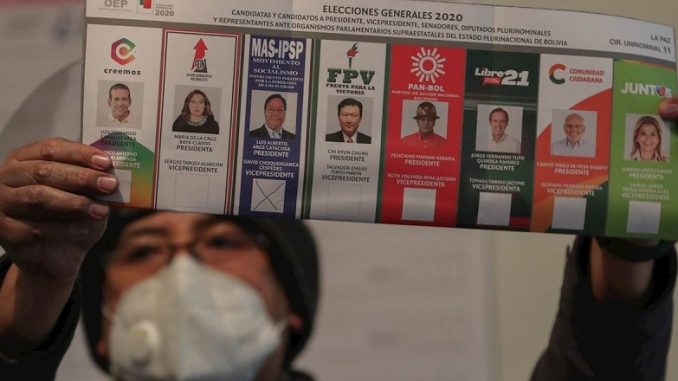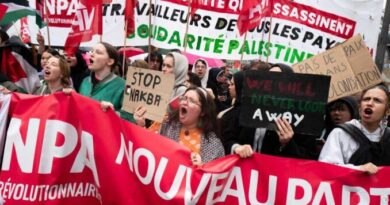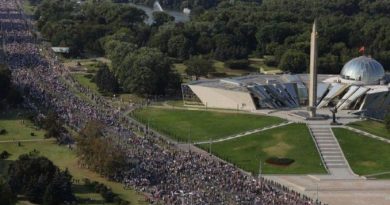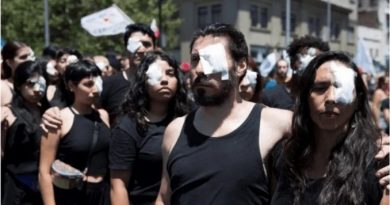Bolivia: MAS triumph and prospects
The Movement Toward Socialism (BUT) won the Bolivian elections with a large majority and is preparing to become the government of the 2020 a 2025. In a Bolivia marked by social polarization, the blue party took him out 20 points to former president Carlos Mesa, who was expelled from the government in the revolutionary days of 2005. Much further behind was a depreciated "macho" Camacho, embroiled in allegations of corruption and reduced to the support of the Santa Cruz oligarchy, where the MAS also got a good vote.
According to the quick count, the MAS would get more of the 52%, Citizen Community of Mesa, something more than 31%, and Camacho the 14%. At the same time, there was a strip of null vote that expresses the lack of a left alternative, partly because the electoral law, that comes from the Banzer government, acts by preventing the legality of independent alternatives of the working class.
A defeat for the Bolivian right
The result shows that everything done by the bourgeoisie to force a polarization that would take it to the second round, it did not reach them. part of that line, endorsed by the Church and imperialism was to "lower" three candidates, including the de facto president Jeanine Áñez, that not even managing the state apparatus did he get the support to maintain his candidacy; and Tuto Quiroga, another former president disgraced. Both joined the call to unify the right-wing "useful vote" in Mesa. They aspired to give governability to a government that was not.
The vote expresses that the right lacks a social base. The working people reject her and identify her as the main person responsible for their sufferings, with racism and surrender to imperialism.
It came to the government mounted on a foreign process. It is clear that it was a sector of the town that rebelled against Evo Morales last year, against economic deterioration and the undemocratic attempt to perpetuate himself in power, bypassing the will of the majority expressed in the referendum on 2016.
The combination of hesitation, inaction and complicity of the MAS and the COB, and the absence of a political alternative to the left of the MAS, allowed the right to wrest the government. But the sectors that rebelled against Evo, they would not support the adjustment program of the right or the government of Añez.
This showed that he only came to steal, privatize, dismiss and remove conquests. Your health disaster, educational, «The third decade of the new century thus projects a new form of cold war…Compared with the strength it had in the first cold war, labor and social, motivated a constant siege of mobilization, and it was a thorough sample of how the right is governing.
Because, a good part of the people resorted to voting for the MAS, in demand of a social agenda. Looking for an answer to popular claims as in the mining city of Huanuni, where the State maintains a debt with the workers of 90 millions of dollars in months of unpaid wages, next to Colquiri and the Vinto company, where its workers and the people demand that wage debts be settled without cuts.
The COB bureaucracy also acted, the federation of miners, the leadership of indigenous organizations, peasant women and residents who aligned themselves with Arce. Without an alternative from the left and before a feared return and continuity of the right, the vote was channeled by the MAS.
Arce should have recognized the expectations expressed by that vote: "The people have many needs that we have understood and we have the obligation to work to respond to all those expectations". The rebellious and combative Bolivian people and their working class are going to demand that this come true, which will surely collide with the reality of the adjustment that comes to implement.
The inability of the right to erect a serious government and the willingness of Arce and the MAS to guarantee the needs of the bourgeoisie, explains that it now appeals to the MAS to apply a stabilization plan and capitalist government. This is shown by the affectionate greetings and wishes for success from the UN to the OAS that, through the questioned Luis Almagro, who last year led the "audit" against Evo, He now says that he is sure that Arce"He will know how to forge a bright future for his country". Similar messages came from the European Union and the Trump administration., who congratulated Arce on his victory, with a clear message: “We look forward to working on our joint interests”.
The more, meanwhile, it also makes clear its willingness to comply with the bourgeois need to “pacify”, and stabilize the situation. After his election victory, both Arce and Evo, made a clear call for “national unity”. That is to say, a unit with the right, in a project of illusory class conciliation that aims to achieve political and institutional stability. All the MAS performance since November, from the institutional recognition of the Añez government to voting for its budget and its laws, were in the sense of demonstrating their capitalist reliability.
The bourgeoisie and imperialism seem to agree with entrusting this task to a government led by Arce and the MAS. By your willingness to accept it, and also because the electoral result gives the right a relative strengthening. The MAS will have a majority in both chambers of the Legislative Assembly, but it will not have the two-thirds it has today, which will require further negotiation with the right.
The COB and the necessary independence to demand urgent measures
After betraying successive processes of struggle and agreeing with Añez, who was joined by a Vice Minister of Labor, the COB was part of today's stabilization policy. This was recognized by the executive secretary of the plant Juan Carlos Huarachi when balancing the vote as the result of the 12 days of blockades and protest that carried out. These originally claimed for health, education, work and for Añez to leave, but the COB accepted the policy of the MAS and Evo of lifting those blockades that had Añez on the verge of falling to divert all struggle to the bourgeois democratic elections and try to rebuild the battered regime.
The COB gambled on that "peaceful" exit, calling to vote en masse and take care of the polls. That is why Huarachi puts as the first claim to recover"political stability" of the boss-capitalist presidential and parliamentary regime.
Nevertheless, the evident pressure from the grassroots leads him to threaten that"the time is short, very short" so that new government answers, revive the economy, ensure job stability and income so as not to live on poverty bonds, reincorporate all the laid-off workers and create jobs from a plan that nationalizes companies and resources under strict worker control and industrialization of resources such as mining.
The COB must maintain its independence from the Arce government and the MAS, of a capitalist nature that does not propose advancing in worker and socialist measures. Arce was already Minister of Economy under Morales in 12 his 14 year rule, without taking measures beyond the limits of capitalism.
The “national unity” of Arce and the MAS
When it is necessary to demand justice for the massacres of the illegitimate government of Añez, maple poses“govern for all Bolivians, build a government of national unity, no hate…”. In a call for unity with the bosses and the right to recover“the certainty to be able to develop economic activity, of the small, medium and large companies.
A piece of information from the campaign is that Arce and Choquehuanca always separated from Morales, saying that he should give an account in court for the accusations and processes. So it was not surprising that Arce never named Evo in his thanks and triumphant greeting. That is why it will be necessary to see if it does not end up resulting in a new Lenín Moreno as in Ecuador.
On the other hand, Morales gave a message alone, with a written text, read carefully. There he insisted with“set aside sectoral and regional differences and interests. To achieve a great national agreement with political parties, businessmen, workers and the state.
Faced with a reissue of the frustrated reformist project to reconcile class interests that are opposed, the perspectives may be marked between the rejection of the pro-imperialist policies and the classic adjustment of the right, with a vote to the MAS of social demands, the betrayal of the COB and the rest of the Unity Pact organizations in diverting the struggles to the electoral exit, and the need to apply a harsh adjustment, in an international context where Bolivia's main resources are falling in value, such as oil, gas or mining.
It is necessary to raise an agenda of urgent demands for health, a single, national system with sufficient resources from the State, for education, work and social income. Demand from the COB, the Federation of Miners and other organizations that propose immediate deadlines for their resolution. The same as the demand for justice in the face of corruption and massacres like those of Senkata and Sacaba. The need to adjust the rich, entrepreneurs and multinationals. To the ecocidal landowners and a necessary agrarian reform. To ignore the external debt to implement a social audit.
If the result of the elections demonstrates anything, it is the need to build a truly socialist and anti-capitalist political alternative., to respond to the desires of the working people that the MAS and the COB disappoint. To this end, It is necessary to advance the unity of the left to launch a political alternative for the working class and the popular sectors, not from capital and national and foreign businessmen.
Correspondent (LIS)




